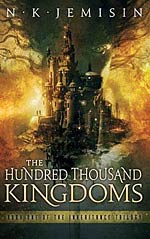
![]() Rhondak101
Rhondak101
7/31/2014
![]()
N. K. Jemisin's A Hundred Thousand Kingdoms does not live up to its blurb, which sounds interesting: "Yeine Darr is an outcast from the barbarian north. But when her mother dies under mysterious circumstances, she is summoned to the majestic city of Sky. There, to her shock,Yeine is named an heiress to the king. But the throne of the Hundred Thousand Kingdoms is not easily won, and Yeine is thrust into a vicious power struggle."
This blurb offers a chance for (1) an outsider look at a culture, (2) a political game, and (3) a bit of mystery. Some of this happens but is executed poorly.
The first-person narration by a 20-year-old "princess" is limited and annoying. For all her "barbarian girl-warrior" skills, she's weak and whiney.
The do-it-yourself cosmology starts out in an interesting direction (based on the Apollonian and Dionysian principles, with a middle term added). However, when Jemisin starts limning the gods' and godlings' powers and imperfections, it seems as if she's really making stuff up on the fly to serve the plot requirement of the moment. When these gods and godlings become characters, they are flat, angsty, and über-brooding. The Lord Nahadoth might as well be a teenaged vampire.
As for the "politics" that is often discussed in relation to the plot... really? The political machinations are lamely portrayed as cruelty. None of the characters in this book, including the gods, seem intelligent enough to pull off any real "machinations." Let me put it this way, I doubt chess is a game that would have developed in Jemisin's culture.
In short, this book is not about gods or politics, it is a coming-of-age story in which a young and naïve girl, who thinks she's a badass, tries to find out why and how her mother died.